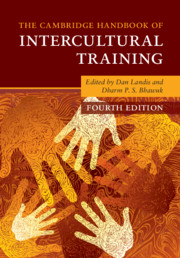Book contents
- The Cambridge Handbook of Intercultural Training
- Reviews
- The Cambridge Handbook of Intercultural Training
- Copyright page
- Dedication
- Frontispiece
- Contents
- Figures
- Tables
- Editors and Contributors
- Foreword
- Preface
- 1 Introduction and Theoretical Framework
- Part I Theoretical Foundations of Intercultural Training
- Part II Practice of Intercultural Training
- Part III Indigenous Psychology and Intercultural Training
- 15 Brazilian Cultural Patterns and Intercultural Training
- 16 Russian Cultural Patterns and Intercultural Training
- 17 Indian Psychology and Intercultural Training
- 18 Culture-Inclusive Theories for Intercultural Training in Confucian Societies
- 19 Japanese Psychology and Intercultural Training
- Part IV New Interdisciplinary Approaches to Intercultural Training
- Part V Summing Up
- Index
- References
19 - Japanese Psychology and Intercultural Training
Presenting Wa in a Nomological Network
from Part III - Indigenous Psychology and Intercultural Training
Published online by Cambridge University Press: 18 September 2020
- The Cambridge Handbook of Intercultural Training
- Reviews
- The Cambridge Handbook of Intercultural Training
- Copyright page
- Dedication
- Frontispiece
- Contents
- Figures
- Tables
- Editors and Contributors
- Foreword
- Preface
- 1 Introduction and Theoretical Framework
- Part I Theoretical Foundations of Intercultural Training
- Part II Practice of Intercultural Training
- Part III Indigenous Psychology and Intercultural Training
- 15 Brazilian Cultural Patterns and Intercultural Training
- 16 Russian Cultural Patterns and Intercultural Training
- 17 Indian Psychology and Intercultural Training
- 18 Culture-Inclusive Theories for Intercultural Training in Confucian Societies
- 19 Japanese Psychology and Intercultural Training
- Part IV New Interdisciplinary Approaches to Intercultural Training
- Part V Summing Up
- Index
- References
Summary
The usefulness of viewing a culture through the lenses of indigenous psychology keywords is the central premise of this chapter. The authors argue that understanding the essence of wa (和) – harmony – in the Japanese experience is vital. Without denying possible etic phenomenology, the chapter argues that several Japanese emic concepts connect with 和 in a nomological network: namely, amae (presumed indulgence), aimai (ambiguity), giri and on (obligation and duty), honne and tatemae (true feelings and overt behavior), and shūdan-ishiki (group consciousness). We conclude by suggesting the use of a folk psychology approach to intercultural training – positive goal-oriented intercultural dialogue leading to the intercultural understanding of indigenous psychology keywords.
Keywords
- Type
- Chapter
- Information
- The Cambridge Handbook of Intercultural Training , pp. 584 - 598Publisher: Cambridge University PressPrint publication year: 2020
References
- 3
- Cited by

